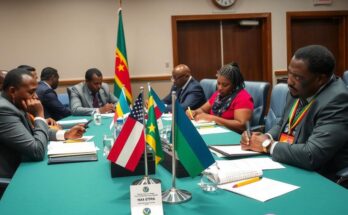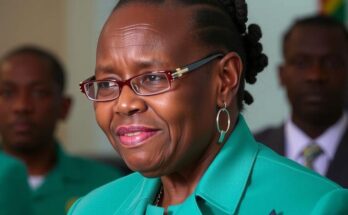The IGF 2024 panel discussed election coalitions as vital in combating misinformation during elections. Experts stressed collaboration among various sectors, introducing successful models from Brazil and the Philippines. Key challenges include maintaining momentum post-election and addressing AI-generated misinformation. Panelists recommended prioritizing relationship-building and neutrality in coalition efforts to effectively counter misinformation beyond election cycles.
The importance of election coalitions in the fight against misinformation was emphasized at the IGF 2024 panel titled ‘Combating Misinformation with Election Coalitions’ in Riyadh. Participants from various sectors, including Google, fact-checking organizations, and journalism advocates, highlighted how collaboration among diverse stakeholders is essential for protecting democratic integrity. The introduction of the ‘Elections Playbook’ by Mevan Babakar from Google outlined strategies for establishing robust coalitions founded on trust and neutrality.
Successful models, such as Brazil’s Comprova, were presented, showcasing a coalition of media outlets dedicated to verifying election claims. Similarly, Facts First PH in the Philippines promotes a community-centric approach to disseminate verified information through influential local figures. Daniel Bramatti, an investigative journalist, underscored the significance of fact-checking as an essential response to misinformation, asserting, “Fact-checking is the free speech response to misinformation,” advocating for prioritizing context rather than resorting to censorship.
The discussion also addressed several challenges faced by these coalitions, such as sustaining momentum once elections conclude, addressing government interference, and contending with AI-generated misinformation. Alex Walden, Google’s Global Head of Human Rights, highlighted the need to maintain neutrality while engaging with governmental entities, stating, “We have to be mindful of the role that we have in engaging neutrally.” The panel also explored strategies for increasing media literacy among youth and non-voting populations, particularly through programs initiated in Nigeria by Africa Check.
Panelists advocated for a collective approach that targets specific issues related to misinformation rather than treating it as a singular problem. This perspective was reinforced by Peter Cunliffe-Jones from Westminster University, who emphasized the necessity of tailored strategies. The session concluded with essential recommendations for those interested in forming election coalitions: focus on cultivating relationships and select coordinators who embody objectivity and independence. It called for ongoing collaboration and adaptation to effectively address the dynamic landscape of misinformation beyond mere election cycles.
In the contemporary digital environment, misinformation poses a significant threat to electoral integrity across the globe. Election coalitions, comprising various stakeholders, play a pivotal role in mitigating the impact of false information during elections. Initiatives like the ‘Elections Playbook’ provide a structured approach to collaboration and have been successfully exemplified through initiatives in countries such as Brazil and the Philippines. The necessity for a unified front against misinformation is increasingly essential, especially as political discourse shifts and technological advancements such as AI emerge. The panel highlighted the critical interplay between governmental engagement and maintaining a neutral stance, which is especially relevant in today’s politically charged climate. Moreover, involving younger demographics in fact-checking activities is viewed as vital for the long-term effectiveness of these coalitions, reinforcing the importance of media literacy in combating misinformation.
To summarize, the panel on election coalitions at IGF 2024 successfully illustrated the urgent need for collaborative efforts to confront misinformation in elections. With examples from around the world and insights from experts across various sectors, the discussion highlighted the importance of trust, neutrality, and ongoing engagement. As misinformation continues to evolve, the advice to prioritize relationship-building and appoint neutral coordinators remains critical for the resilience and effectiveness of these coalitions.
Original Source: dig.watch




